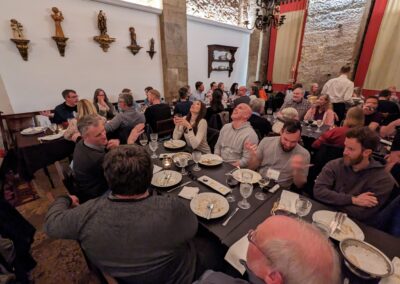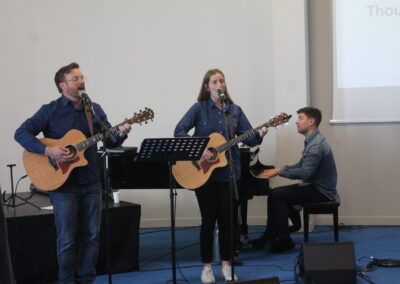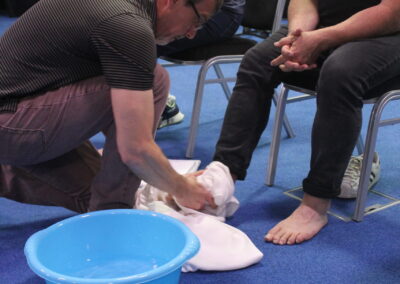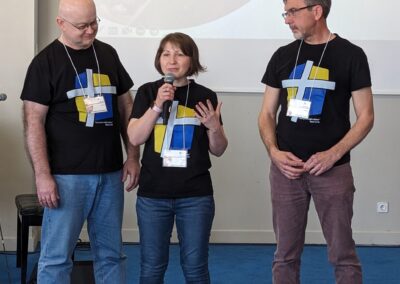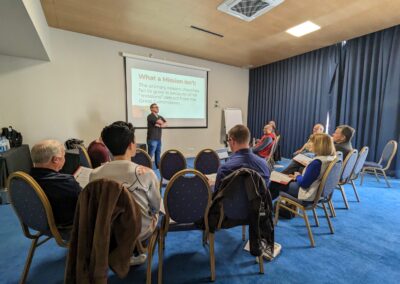Turn the World Upside Down is the Challenge of MLC 2023
Ralph Cunnington, pastor of City Church, Manchester, England, challenged those attending the IBC’s Ministry Leadership Conference, 17-21 March in Lisbon, Portugal, to turn their world upside down.
Preaching through 10 chapters of the book of Acts (Acts 11:19-20:38), Cunnington used the Jerusalem church and particularly the Antioch church to draw parallels to the international church of today. Just like the Antioch church, IBC churches today need to be a hub church, a sending church, a church that reaches the city, and a culturally engaged church. The church today, like the 1st century church, faces danger and always needs shepherds.
In his opening message, Cunnington reminded those attending that up until Acts 9, no Gentile had committed to Christ. It took three visions for Peter to go to the Gentiles. Yet, in chapter 11, Cunnington said, there is a shifting of gears. The focus shifts from Peter to Paul and from the Jerusalem church to the church in Antioch. Antioch was an international hub church to the Gentile world. A hub church has three features, Cunnington said – it was gathered widely, it was trained in the truth, and it gave away generously (Acts 11:19-30).
In the 1st century, everyone wanted to go to Antioch, but it was also very broken. It was the Manchester, Berlin, Lisbon, or Paris of the ancient MidEast. But the gospel came to Antioch. The church at Antioch was made up of believers from around the ancient world. They came to Antioch because of the persecution happening in Jerusalem. But it was God’s reason for turning the world upside down. In 11:20, “men from Cyprus and Cyrene” came to Antioch. These were unnamed, ordinary men who God used to gather His church.
The church was trained in the truth. Once the church was planted, this became the priority. The church in Jerusalem sent one of their best – Barnabas – to teach them and help them remain true to the Word, Cunnington said. He cheered them on to persevere; he taught them. He knew he needed help, and he invested his own time and resources to get the best trainer. A hub church cannot grow without Barnabases, Cunnington said. Growing churches need to invest in training; God expects us to share the load and train new people
A hub church gives generously. The Jerusalem church sent one of their best to Antioch. Later, Antioch gave back materially and sent two of their best to hand-deliver the offering. As international churches, there is a temptation to give up emotionally, Cunnington said, because people are always leaving. Yet, for our sake, Christ became poor so that we might become rich (2 Corinthians 8:9).
In his second message, Cunnington fast forwards several years as Antioch becomes a sending church in what he likes to call the “Antioch Project” – a church plant that is planting churches. Like Antioch, a sending church has three characteristics – sending is driven by worship, sending means sacrifice, and sending requires courage;
In chapter 13, Cunnington said, the names of the leaders are listed. This is to illustrate how mixed the church in Antioch is – socially, ethnically, economically, culturally. The church is mixed and so is its leadership. Worship is not just the end of mission but the start. Yet, sending requires sacrifice and courage. Paul and Barnabas arrive back from Jerusalem – ready to lead and disciple. But the Holy Spirit leads the Antioch leaders to set apart their best men for a mission and send them again. If a church is sending, Cunnington said, it will meet interest and opposition. It will take courage to determine when to meet opposition with a conciliatory approach or a no-holds-barred approach. Are we willing to be a sending church? Are we courageous enough to go .. to send .. to send our best? He concluded this message with the quote: “A mark of a great church is not its seating capacity but its sending capacity.”
“What will ruin the church you lead?” Cunnington asked at the beginning of his third message. In Acts 1-11, we see the Jerusalem church grow from 28 to 3,000 then 5,000 plus women and children. In chapters 13-28, we see the church at Antioch grow rapidly in numbers, diversity, and depth. Then, in chapter 15, we see a problem that could bring everything down, Cunnington said. The gospel was being attacked at its very core. In the first 14 chapters, the good news was received by grace. Now in chapter 15, believers are wanting to require circumcision for salvation.
“What makes Christianity unique?” Cunnington asked. All others say, “Do this.” Christianity says “Done.” Jesus plus anything denies the gospel. The moment we add to the good news, we make it nothing. The gospel is for all people, at all places, at all times. God is glorified as people from every tribe, nation, and tongue gather to worship Him.
In verses 6-19, we see the gospel defended, Cunnington said. This issue is so serious that Paul and Barnabas put everything on hold to go to Jerusalem. There they defend the gospel message. There the apostles and elders determined not to make it difficult for the Gentiles to become believers. They describe four rules for Gentiles to follow that would show them how to live out the gospel and let it shine – make a firm and decisive break from worshipping idols; live radically different from the world around them; and do not make it difficult for your Jewish brothers to come to salvation.
Ministry in the post-Christian world is hard, Cunnington said in session four. There is a temptation to give up. In Acts 16, we find three surprising conversions that give us hope. In Lydia’s conversion, we see God will work through His Word. Our job is to speak; God’s job is to open hearts.
The slave girl in verses 16-21 is the equivalent of today’s trafficked prostitute that we are called to care for and protect. Most of our churches don’t have trouble reaching Lydias, Cunnington said, but that approach won’t work with people like this woman. We can’t invite them in; we have to go to them. We have to address their spiritual problems as well as the physical needs. We need to bring them freedom in Christ.
We need to make the most of every opportunity that we are given is demonstrated in the conversion of the Philippian jailer. Paul and Silas were praying and singing praises despite having been beaten and put in stocks; they had a captive audience. In incredible pain, they reached out to help a dying man.
Each of these three conversions are extremely different, Cunnington said, but each was saved by the same gospel and welcomed into the same church.
Twenty-first century Europe has more in common with 1st century Europe than with Europe 50 years ago, Cunnington said in his fifth message. Christianity is a small minority and is dismissed as irrelevant. Becoming a culturally engaged church doesn’t start in the culture; it begins in our own hearts.
We must mourn and go. “Do you share care and concern for those in your city?” Cunnington challenged. Paul chose to go and preach in the places from where news was spread. Our approach is usually, “come and see.” Instead, we need to “go and tell.”
As we tell, we need to engage and challenge our listeners. And we need to tell of wrath and repentance. We have to insist there is a right and wrong. Becoming a Christian is a radical change of direction. We can turn because Jesus is the one who never turned; He followed the path set before Him by God.
Cunnington concluded his series of messages with a word for pastors and leaders. In Acts 20, Paul wants to get to Jerusalem in time for Pentecost but he wants to meet with the elders from Ephesus. Paul had a message for the elders that is just as important today as then.
Watch yourself, Cunnington said. There are lots of different ways to shipwreck your ministry. Two key dangers are stress or burnout and sexual sin. God’s people’s greatest need is not your overwork; it’s your holiness, Cunnington said.
Shepherd or tend to the people. Without faithful Bible teaching, people will wither and die. We need to be discipling people all the time. The most fruitful time of ministry and Bible study is in the homes of members.
Guard the people because there are savage wolves about. Churches are not destroyed by persecution; they are destroyed by false teachers. The wolves’ methods are to distort the truth to draw the people to themselves.
A church needs shepherds, Cunnington said. We want to be Antioch churches. All we do is nothing if we don’t have faithful shepherds, Cunnington said. We need to pray for each other and keep our eyes on Jesus.
Cunnington’s messages are available on the IBC YouTube channel: https://www.youtube.com/@ibcgermany.
In addition to Cunnington’s messages, participants could choose from a variety of seminars including Being a Church on Mission, Freedom in Christ, Reaching Muslims through International Churches, Reproducible Disciple-Making, How to Prevent or Recover from Burnout, Values in Action, Raising Third-Culture Kids, International Ministry: Living and Loving the Pilgrim Journey, Perceiving God’s Vision for Your Church, Prioritizing Relationships and Results, Developing Leaders: The IBC Residency Program and the Aquila Initiative, and a Church Planting Panel.
David Martin and Daniel Matzeit from IBC Cologne and Naomi Brown from ICF Oberursel led the worship in song times. Martin and Matzeit also led a concert of prayer time on Monday morning.
Ninety people from 25 churches attended the conference. On Saturday afternoon, everyone enjoyed a bus tour of Lisbon followed by a typical Fado dinner.
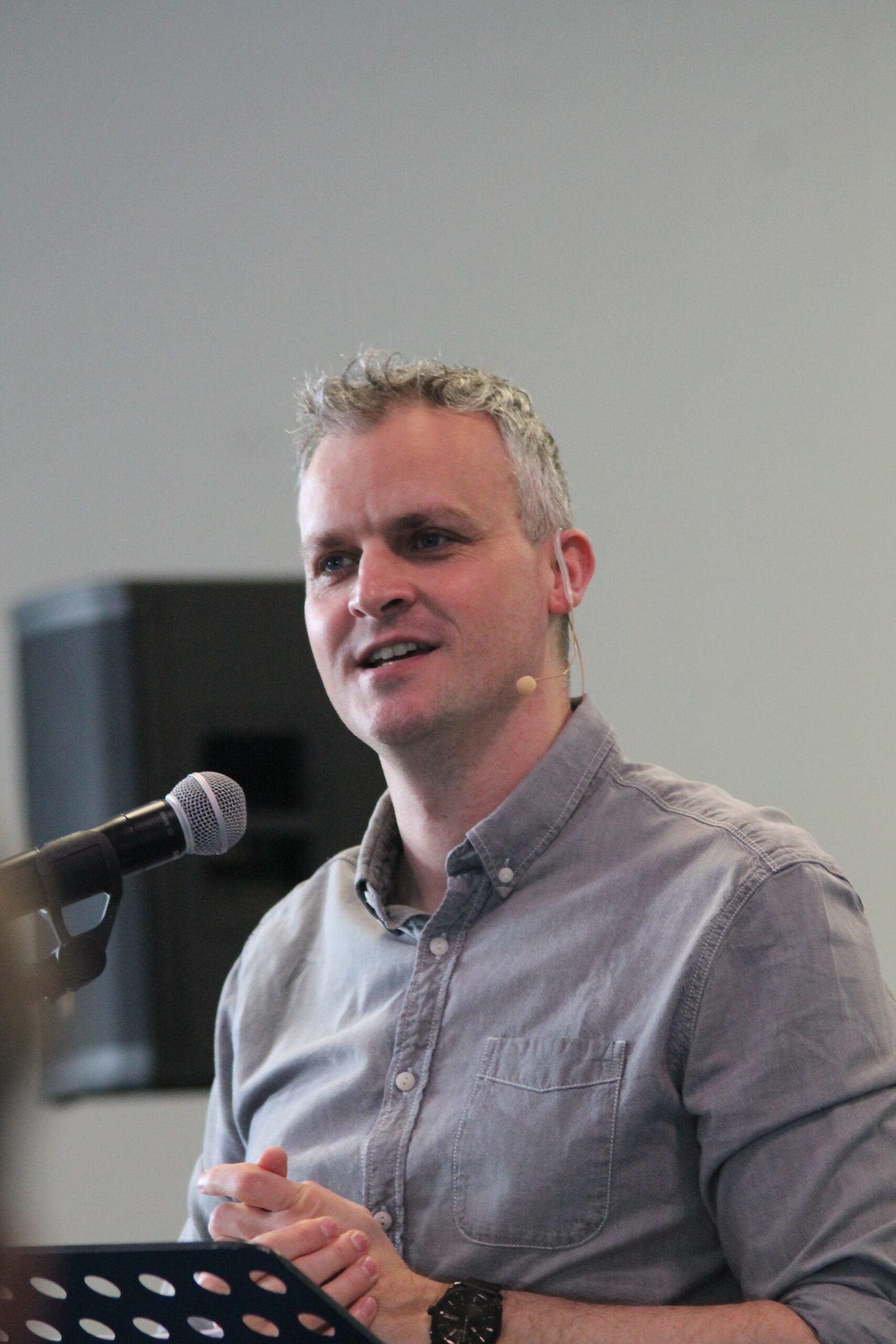
Ralph Cunnington

